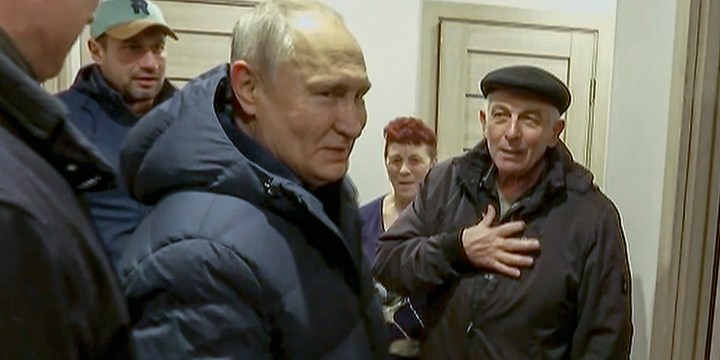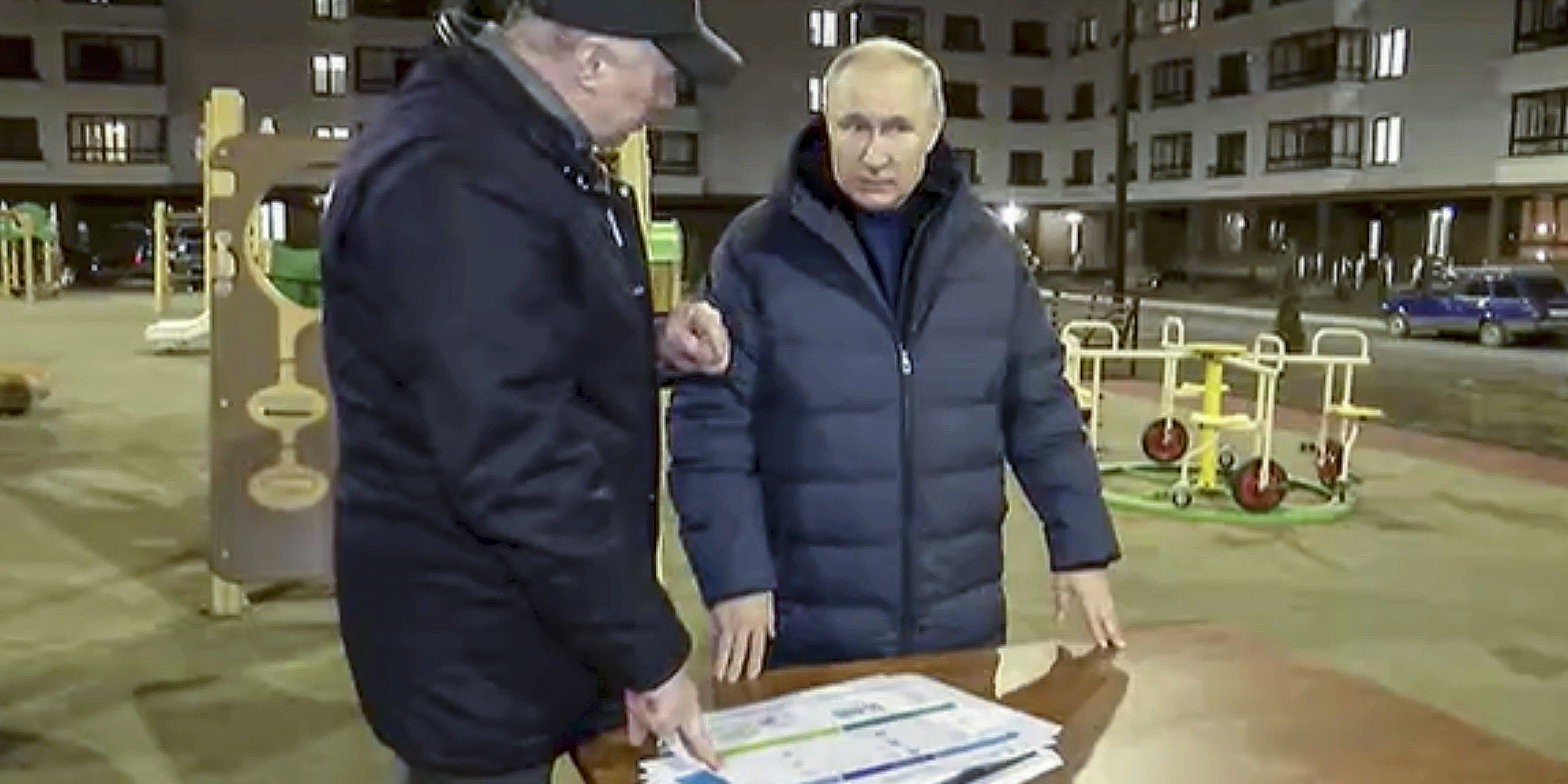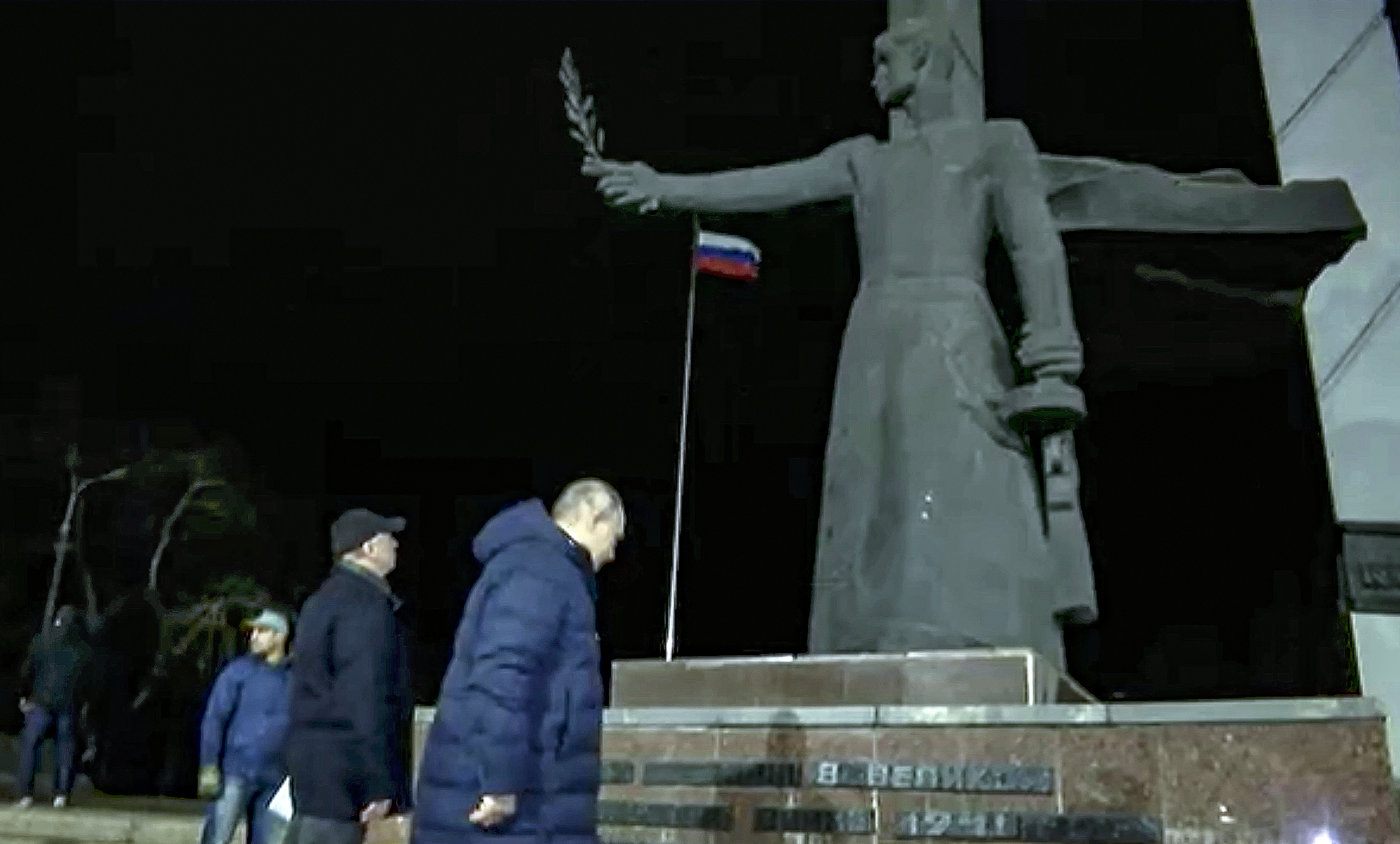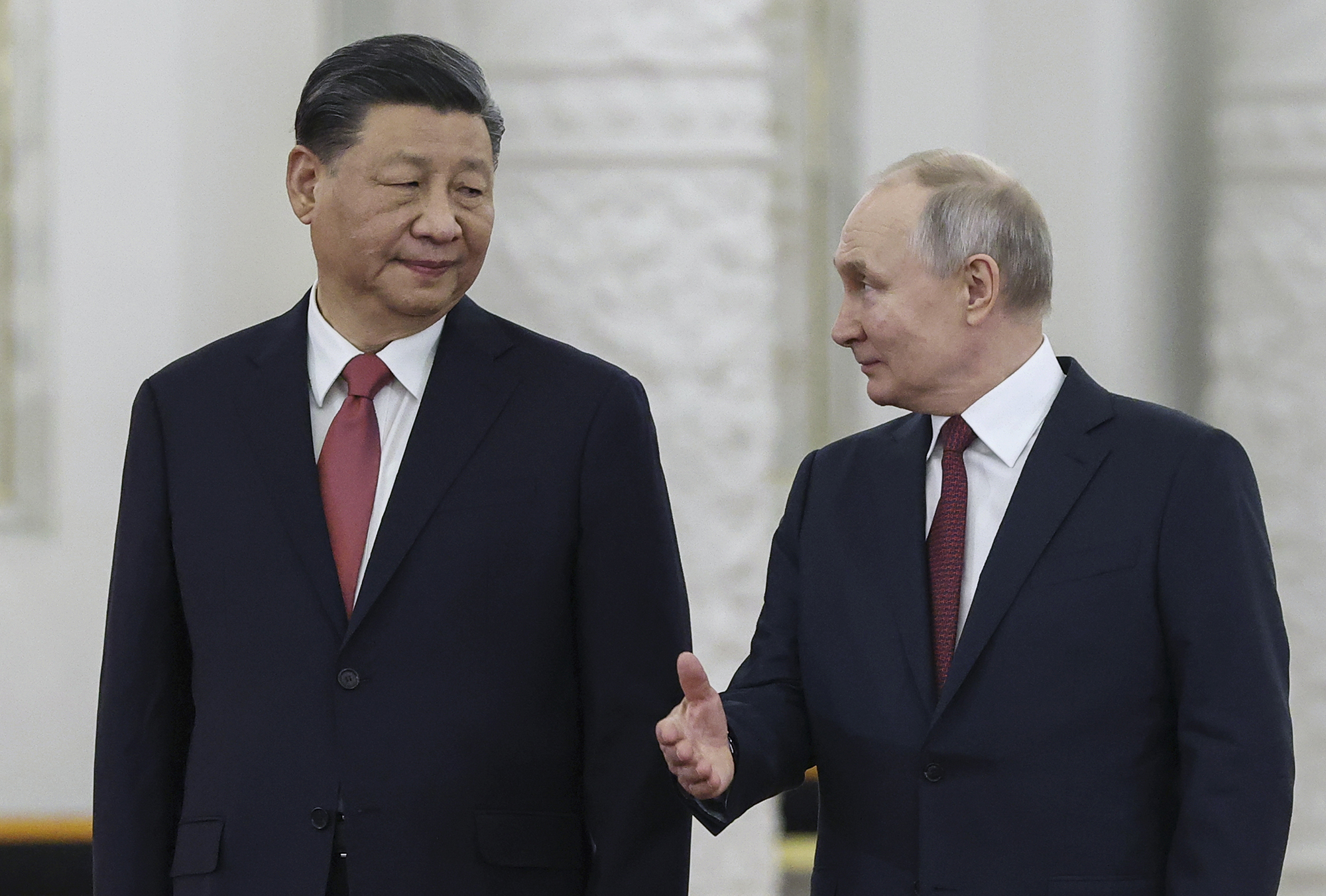WAR IN UKRAINE
Under pressure: And so, Mr Putin, how has your war been going these days?

The month of March has already witnessed some extraordinary twists and turns in Russia’s invasion of Ukraine. There may yet be more unanticipated events in store for this conflict.
During the past several days, the Ukraine war has seen important developments, even if there still is no sign – at least not yet – that the hostilities are anywhere close to being brought to an end. This is true despite a new Chinese peace plan (truthfully, it is a sketch of a possible plan, not an actual roadmap towards achieving peace on the battlefield).
Regardless, by week’s end, putting on a brave face, Russian President Vladimir Putin had carried out something like a faux victory lap amid the wreckage of the ruined city of Mariupol, complete with some staged thank-yous from a few remaining residents for some rebuilt apartment blocks.

Russian President Vladimir Putin (right) and Russian Deputy Prime Minister Marat Khusnullin (left) examine a plan to rebuild the city during his visit to Mariupol, eastern Ukraine on 18 March 2023. Putin visited the Russian-occupied city after he visited Crimea on the ninth anniversary of the Russian annexation of the Black Sea peninsula. According to the Kremlin, Putin had conversations with residents, visited an apartment, assessed new roads and followed the construction of new facilities in the city. (Photo: EPA-EFE / Russian President Press Service Handout)
To an outsider, this episode had more than a bit of the Potemkin village feel to it. (Grigory Potemkin, the origin point for the now-ubiquitous term, had been an 18th-century military commander who had famously impressed his sovereign and lover, Catherine the Great, by building fake storefront villages for her to see along her stately progress via a royal barge, as she journeyed along the Volga River. As soon as she had passed a fake settlement, he had it torn down and quickly erected again further downstream, just ahead of the czarina’s arrival.)
Visit Daily Maverick’s home page for more news, analysis and investigations
Mariupol is, of course, a place Putin’s military had pulverised into a landscape of obliterated factories and destroyed homes as it had become a significant roadblock for the Russian army when it was en route in its drive across southern Ukraine, until the city was virtually reduced to rubble.

Russian President Vladimir Putin (right), with Deputy Prime Minister Marat Khusnullin (second left), stand near the World War 2 monument during his visit to Mariupol, eastern Ukraine, on 18 March 2023. (Photo: EPA-EFE / Russian President Press Service Handout)
But by late last year, a major share of that advance had been rolled back by Ukrainian forces, as they recaptured the strategically located city of Kherson. Their counter-offensive had been made possible once the Ukrainian army’s capabilities (its resolve, morale and determination had never been at issue) were stiffened by a flow of Western-supplied weaponry and ammunition.
Without any sense of irony or embarrassment, the Russian presidential party strutted across that landscape and poked their heads into partially rebuilt civic buildings, looking satisfied, serious and sombre. They were acting as if the capture of the blasted ruins of Mariupol had been a major victory in their titanic struggle against Nazi Germany’s Barbarossa Campaign more than 80 years ago.
Fighter jets
In the meantime, first Poland and now Slovakia have both agreed to transfer fighter aircraft from their stockpile of older model MiG-29s to Ukraine. Those planes date back to the days of the Soviet Union and are hardly a match for the newest Russian MiGs or Sukhois in aerial dogfights (think of those depicted in the film, Top Gun Maverick), nor are they the equal of top-end US and other Western fighter aircraft such as F-35s.
Nevertheless, these Polish and Slovak craft are planes Ukrainian pilots will be familiar with in terms of their flight characteristics and operational systems. As a result, they should be useful almost immediately as ground support craft for attacks against Russian troop and tank concentrations in spring offensive movements that are almost certain to take place.
These transfers of fighter aircraft may also set the stage for more transfers from other Eastern European Nato member nations which may still retain such craft in their inventories. That would give Ukrainian forces opportunities to achieve a better balance against the invaders’ forces.
Those transfers, along with upcoming arrivals of first-line tanks and additional anti-aircraft weaponry from the West, should make it that much harder for the Russians to achieve real theatre of battle supremacy in the coming months — as long as the supply chain of ammunition from the West can be maintained. Moreover, a likely IMF loan should make the Ukrainian state’s economic and financial circumstances less fragile as well.
Recently, too, there was the air encounter between a Russian fighter jet and an American drone reconnaissance craft over the southern part of the Black Sea. The drone crashed into the sea, but not until, according to American officials, the operators managed to disable or delete any secret software that could have been compromised or downloaded, in the event the Russian navy retrieves fragments of the drone’s sophisticated (and secret) elements from the sea’s depths.
This incident could have been so much worse than it was. Just imagine a direct encounter between two manned fighter jets — one Russian, one American — and one of the pilots killed as a result.
Had that happened, by now the world would likely have entered different and much more dangerous territory as a result of hostile, direct contact between American and Russian forces. There would not have been an easy roadmap for how to move away from that space, especially given Russian assertions that the entirety of the Black Sea is an operational area for its war on Ukraine — a position in violation of the understandings of international law.
Xi Jinping

Chinese President Xi Jinping (left) and Russian President Vladimir Putin attend a welcome ceremony before the Russia-China talks at the Kremlin in Moscow on 21 March 2023. (Photo: EPA-EFE / Sergey Karpuhin / Sputnik / Pool)
Then, too, there has now been the arrival in Moscow on Monday by Chinese President Xi Jinping. Russia and China, at least publicly, say they are keen to strengthen and underscore longstanding friendship and mutual respect as real leaders for a new world order.
Almost certainly the Russians will be angling for something a bit more tangible — say a quiet commitment to supply weaponry and other material now in short supply as a result of a so-far-disastrous invasion of Ukraine that is consuming men, machines and all the other supplies needed in modern warfare.
Meanwhile, the Chinese almost certainly hope to improve their access to Russia’s bountiful supplies of oil and gas, especially if they can gain access at bargain basement prices, as the Russians are finding it harder and harder to sell it elsewhere due to a growing tangle of sanctions and financial restrictions.
The final joint communique will obviously be replete with love and kisses, and perhaps some tangible benefits in the form of agreements on Chinese imports of raw materials. It is unlikely, however, that the final communique will come festooned with audio-visuals depicting trainloads of Chinese-built tanks and drones moving westward for imminent destruction by stinger and javelin missiles.
International Criminal Court
Surely the most astonishing event of the week, however, has been the decision by the International Criminal Court in the Hague, Netherlands, to charge Putin and Russia’s children’s commissioner, Maria Lvova-Belova, with war crimes from actions taken in Ukraine by Russian forces. This decision was issued shortly before Putin visited Mariupol — or at least just before news of that visit was announced.
Care needs to be taken in discussing this decision. Inevitably, there will be reactions by some that it was an unfair, biased and surreptitiously manipulated decision by the West, and it ignored all the terrible atrocities of wars and conflicts committed by others. And, inevitably, too, they will say, such a decision represents an instinctive anti-Russian bias.
But key is the fact that this ICC charge does not encompass the enormity of all the crimes that have come as a result of the Russian invasion, let alone evolve from growing mounds of evidence describing the treatment of non-combatant, innocent victims, or even captured fighters in territories occupied by Russian troops. Then there are those crimes committed by the mercenary Wagner Group formations that similarly do not form part of the judgment, heinous though such acts have been.
The ICC arrest warrants are specifically about the forced abduction of children — reportedly including newborn babies — from Ukrainian families, orphanages, care homes and even maternity hospitals. According to Ukrainian sources, the total of such abductions has now gone beyond 16,000 – with the children bundled off to new homes hundreds of kilometres away in Russian territory (or perhaps in Ukrainian territory still controlled by Russia). These children will be forced to surrender any hopes of being reunified with their actual relatives.
Deportations
As this ICC decision was announced, this writer was reading a newly published book by British historian, Simon Sebag Montefiore, “The World: A Family History.” In its early chapters, there are frequent references to the forced deportations of whole tribes and peoples by conquerors such as the ancient Assyrians and Babylonians. Such actions are things one could easily think of as having taken place millennia ago, rather than right now, before our eyes, by modern civilised nations.
But then we should recall mass deportations of the Tatars and others from Crimea in the aftermath of World War 2 by the Soviet Union. Or, in the previous century, the expulsion of the “Five Civilised Tribes” of Amerindians on the “Trail of Tears” from the American Southeast to the Oklahoma Territory during the administration of President Andrew Jackson.
Still, it is hard to find much in the way of modern examples of an invading army specifically rounding up children to send them into coercive, permanent exile, deep inside the invader’s nation. Perhaps this may be partially in response to Russia’s collapsing birth rate and predicted population decline in the next several decades, or as one more method of attempting to cow resistance against the invaders. Just maybe there is a rough parallel with Boko Haram’s efforts in northeastern Nigeria in their kidnappings of hundreds of schoolgirls (although there, the goal seems to be one of simply achieving ransom revenues).
In South Africa, there was the capture of Khoi and San children in the early days of the Cape Colony, as slaves and farm labourers. This Russian policy has clearly been a particularly inhumane one with roots in behaviours one would have thought had been left behind in human progress.
Let us think for a moment about the number, some 16,000+ kidnapped children. It would be about 40% of the total student population of Wits University or about half the number of people who would fill a local, major sports stadium’s seats. It is twice the total number of battlefield fatalities for Americans in their Revolutionary War. And it is larger than the total number of Soviet troops killed in their decade-long, unsuccessful war in Afghanistan. Further, it represents about a third of American fatalities in all their conflicts in Indochina from 1956 to 1975.
Then, too, what must not be forgotten is all those Ukrainian families whose grief is palpable as they are unable to obtain any information about the location, circumstances or futures of their children. Soon enough those children will have forcibly been remade into little Russians and their birth families lost to memory. Some of the older ones may even, over time, be drafted into Russian military formations to fight against their own nation.
Obligatory arrests
Given the ICC’s decision on Putin and his henchwoman, and in accordance with the ICC’s establishment, it is now incumbent on signatory states to the ICC (like South Africa) to arrest the two individuals should they make their way to one of those nations — either on official or private business. Uh-oh, we have been here before, haven’t we?
Several years earlier, readers should recall then-Sudanese President Omar al-Bashir had been charged by the ICC with carrying out war crimes for his leadership of his nation’s military, and the Janjaweed militia in carrying out campaigns that traduced the human rights of or killed innocent inhabitants of Darfur, the western region of Sudan.
Despite this determination hanging over his head, al-Bashir had chosen to attend an African Union summit in South Africa. Not only did South Africa decline to arrest him and then turn him over to the ICC as it was legally bound to do as a signatory to the ICC treaty, but the Zuma government arranged for al-Bashir to leave South Africa secretly, departing from a military airport.
BRICS summit
Significant international opprobrium poured in against this action, as well as serious domestic criticism from many quarters. Nevertheless, the government shrugged it off with an insouciance it may find harder to do in the current case, if Vladimir Putin attends a BRICS summit in South Africa in August. Importantly, such ICC decisions stay in force until the person so charged is either turned over to the court — or dies.
While no one really expects the South African government will tell Putin to put his hands up, slap some handcuffs on him and turn him over to the ICC’s chosen enforcement authorities, the ugly publicity that will accompany his attendance at the BRICS meeting may well become the primary focus of news coverage of the event.
It likely would outweigh anything else being discussed, even if the Russians do not commit a new atrocity as part of their military campaign. And, given this ICC decision, Putin’s travels to many other nations around the world are now that much more problematic for him. It is possible not every nation is prepared to be as supine as SA has been when it comes to embracing awkward ICC decisions.
The immediate reaction by the Russians to this determination has been a completely dismissive one, arguing that this ICC decision is irrelevant and immaterial, something cooked up by the country’s enemies, and, in any case, they are not bound by anything the ICC may say, anyway, so there. (This position has an interesting echo with the American position on the court in that they say they are not necessarily bound by ICC decisions either, as a number of other major nations have also said. Nevertheless, in this case, the Americans are arguing the decision against Putin and his children’s commissioner are correct, as President Biden has said, given the horrific nature of the crimes they have been convicted of by the court.)
There is, of course, another aspect to this decision, besides the ethical dimension of the appalling Russian behaviour. That is whether such a decision might contribute in any way to stiffening Russian resolve to wade ever deeper into their very own military quicksand, and wreak still more devastation on Ukraine — even as the Russian military cannot yet be forced back to the status quo antebellum start line.
Eventually, there will be negotiations of some kind between the warring parties. Negotiations in diplomacy always represent a balance in some way between carrots and sticks that can be offered or imposed. Charging the leader of one participant with war crimes probably removes carrots, largely leaving only the sticks, despite the appropriateness of the charge. With the leadership of one of the two nations now publicly branded as an international scofflaw, committing crimes against humanity, this may be unlikely to soften Putin’s negotiating stance.
How it might end
Having said that, readers can indulge this writer for a minute in thinking how it all might come to an end. It is just possible such a charge of war crimes hanging over Putin’s head might tempt others in the Kremlin to find a way to offer a trade. Drop the charges and we shall negotiate in good faith. Consider it a version of an international plea bargain.
Or as an alternative, here is yet another scenario. Given the ongoing lack of success in the war against Ukraine and the deleterious effects the war is now having on Russia, following an unexpected shift in the power relationships inside the Kremlin, the following offer comes to be made. Here it might say something along the lines of: “Okay, here are your two bad guys. Please, take them away and do what you want with them. Now let us figure out, like reasonable adults, a way to end this war, the sanctions, and those unfair external pressures on us. We can all agree to a security guarantee for Ukraine (never Nato membership, but okay with Ukraine joining the EU). We can negotiate about the final boundary adjustments and any reparations later.”
If not this version, soon enough there will be many other ideas flying about, and more will continue to be proposed — beyond the Chinese version.
Somewhere, somehow, some of these ideas may finally take hold — that is before a catastrophic implosion in Russia takes place, or before an escalation by Russia into a wider war through a military version of a last-ditch “Hail Mary pass” occurs, or perhaps a wider confrontation (or even a sudden realisation of those dreadful possibilities) breaks out when an unexpected event forces such an eventuality.
Such an event could be something like a fatal incident between opposing, manned fighter jets from Russia and a Nato nation. Surely there are still a few adults left in the global room to bring the conflict to an end.
But the clock is running. DM

















 Become an Insider
Become an Insider
This is the second article published in this newspaper in recent days on the issue of potential war crimes in Ukraine and the possible consequences for Putin- a topic of huge importance.
This article is by far the more incisive of the two.
It offers a realistic assessment of the broader military and political
It also has the advantage that this author has unsullied credentials in a matter as controversial as this.
A very worthwhile read !
If the Chinese premier is serious about wanting to end the war in Ukraine, rather than pandering to the ego of “his trusted ally”he needs to lean on him, as friend-to-friends often need to do, and make him face up to realities.
Clearly, the Chinese want Russia to remain a force – it does not want a weak vacuum on it’s western border with that country. but fundamentally he needs to be thinking in terms of what would be best for China in the longterm; thus would it not better suit Chinese interests for China to almost position itself as the swing voter, and raise the undesirability, thinking in Russian terms, of the possibility of opening up and eastern front along Russia’s, very long, border with China?
This ought to have the effect of sharpening Putin’s mind as to the essentiality of getting out of Ukraine promptly, perhaps keeping the three previously stolen provinces – in order to keep Russia “face”as they say in Asia – and then China to assist the World in re-building Ukraine?
This has the advantages of putting a human face on China, elevates them onto the same level as the USA in global eyes, enables Russia to focus it’s energies on re-building it’s state, and enables the World to come together again?
It might even make it’s advances to Taiwan to be more acceptable to the peoples there – because presently they see China in very negative terms. China might then indeed come to be seen globally as a positive force for good.
China can then get on with deepening it’s trade ties to Russia, it’s bonds of comradeship – but it is then very clear who is calling the shots – and thus the World is bi-polar with China holding one of the key seats. How much of a true international; diplomat can China really be? I wonder if Wu Jinping ever played that excellent board game, Risk; it really sharpens your Machiavellian mind !!
South Africa must advise President Putin not to attend the BRICS summit in South Africa in August. There cannot be a repeat of the al-Bashir fiasco.
I love the photo op. Xi looms over Putin, both physically & metaphorically.